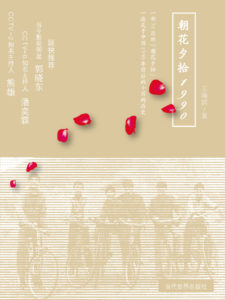Puppy Love
小情书
China, 2017, colour, 2.35:1, 95 mins.
Director: Qiao Liang 乔梁.
Rating: 7/10.
Way-above-average high-school film, with fresh twists on the genre and fine performances.
A city in northeast China, the present day. Wang Kai (Zhao Shunran) works in the divorce office, where one day he’s surprised to see his senior high-school deskmate Ye Hongying (Zhu Yanmanzi), now 30, come to divorce her husband, businessman Xu Tong. Because Xu Tong has forgotten to bring a document, the divorce cannot be finalised on the spot and he is due to leave on a business trip the next day. Wang Kai is dazed after meeting Ye Hongying again, and his mind goes back a decade or so to the winter of 2005-06, when she joined the school. They briefly noticed each other in the corridor, and it turned out that her home was in the same backstreet as his. After Wang Kai’s deskmate, Qiao Guanghou (Zhao Jianlei), got him into trouble with his parents (Ren Shuai, Liu Dan), Wang Kai took revenge by faking love letters to him from a fictional girl. However, when Qiao Guanghou became lovesick, Wang Kai realised he’d gone too far. He decided to let him down slowly by persuading a girl at the school to pose as the fictional one for a while. After seeing Qiao Guanghou and Ye Hongying chatting one day, Wang Kai asked her if she would help out. She initially rejected the idea but then suddenly changed her mind. Following a crackdown on school discipline and inter-student relationships, Wang Kai and Ye Hongying’s class teacher was changed from the lenient Meng (Gao Zifeng) to the ultra-conservative Miss Lu (Yang Qing). Despite being warned, the rebellious Ye Hongying refused to keep her distance from Qiao Guanghou, saying they were only helping each other out, not having a relationship. After Qiao Guanghou had a mental breakdown and was sent home, Ye Hongging buried herself in school work and Wang Kai, taking his studies more seriously, approached her to borrow some notes. After getting to know each other better, she eventually asked if she could take Qiao Guanghou’s place as his deskmate. Spring arrived, then the hot summer, and the countdown to the university entrance exam began.
REVIEW
Far better than its soppy English title suggests, Puppy Love 小情书 is a superior high-school movie with some fresh twists on the genre and an offbeat approach to its teenage relationships. This latest feature by director Qiao Liang 乔梁, 48, known for “China’s first lifestyle movie”, the super-glossy Esquire Runway 时尚先生 (2008), and family drama Accordion 手风琴 (2008), boasts fine performances down the line and a subtle control of the drama that attests to the director’s experience. Though it’s only Qiao’s fourth big-screen movie, he’s been in the business for over two decades, with a steady supply of digital movies and TV drama series between theatrical outings. Alas, the film hardly registered on the box-office charts (RMB3 million).
 The script by Song Liying 宋丽颖 – who’s written and directed two shorts in her own right – is based on the novella Love Letter 情书, the longest of four stories in the 2015 collection Dawn Blossoms Plucked at Dusk 1990 朝花夕捨1990 by Shandong-born writer/documentary filmmaker Wang Haibin 王海滨 (see left). The stories, seasoned with a heavy helping of Wang’s own memories, focus on high-school students during the 1990s, with the book’s title riffing on Lu Xun’s 1932 collection of essays about his youth. The script reconfigures the story from one about Gen-80ers into one about Gen-90ers, setting the main action in 2005-06, as a long flashback triggered by a meeting in the present day. At first, things seem pretty conventional. There’s the central quartet of male pals, the fooling around in class, the liberal male teacher and the uptight female teacher, the girl who hangs out with the boys, the school’s female tubbie and so on. Stir in the beautiful new arrival in class who sets our hero’s hormones twitching – and also happens to live round the corner – and the stage looks set for a regular high-school movie.
The script by Song Liying 宋丽颖 – who’s written and directed two shorts in her own right – is based on the novella Love Letter 情书, the longest of four stories in the 2015 collection Dawn Blossoms Plucked at Dusk 1990 朝花夕捨1990 by Shandong-born writer/documentary filmmaker Wang Haibin 王海滨 (see left). The stories, seasoned with a heavy helping of Wang’s own memories, focus on high-school students during the 1990s, with the book’s title riffing on Lu Xun’s 1932 collection of essays about his youth. The script reconfigures the story from one about Gen-80ers into one about Gen-90ers, setting the main action in 2005-06, as a long flashback triggered by a meeting in the present day. At first, things seem pretty conventional. There’s the central quartet of male pals, the fooling around in class, the liberal male teacher and the uptight female teacher, the girl who hangs out with the boys, the school’s female tubbie and so on. Stir in the beautiful new arrival in class who sets our hero’s hormones twitching – and also happens to live round the corner – and the stage looks set for a regular high-school movie.
However, the film fans out in unexpected ways, first taking a long left turn with the story of a prank (faked love letters) that goes tragically wrong, before it eventually returns to the two main teenage characters. But by then so much water has passed under the bridge that a conventional story of first love doesn’t seem on the cards. The coda, as the two take the train to their universities in Beijing, is unblinkingly pragmatic – as befits two Gen-90ers – and the final brief return to the present underlines that pragmatism with a small revelation. From starting out as a straight genre movie the film has ended up as a tartly romantic tale of a love story that hardly even started.
Qiao’s control of the movie’s overall architecture – almost like a theme and variations – is impressive, as is the way the characters (even the parents and teachers) develop in an involving way. As well as the nuanced photography by Huang Lian 黄炼 (Eternal Moment 将爱情进行到底, 2011; Spicy Hot in Love 爱情麻辣烫之情定终身, 2016), which moves from a snowy northeastern winter to the break of spring with a kind of realist poetry, the score by Zeng Guang 曾光 is always on the button, whether jazzy, wistful, magical or giving way to songs.
In his film debut, Chinese Idol 中国梦之声 alumnus Zhao Shunran 赵顺然, 22, makes a likeable male lead, creating good chemistry for his mildly rebellious character not only with fellow students but also with his parents (nicely played by Ren Shuai 任帅 and Liu Dan 刘丹); and as the friend on whom he plays the prank, Zhao Jianlei 赵健雷, also 22 and debuting, is entirely believable as an unhandsome kid who can’t believe his luck. Moving between the two, as the new girl in class, more experienced actress Zhu Yanmanzi 朱颜曼滋, 23 (basketball film Meeting the Giant 再见巨人, 2014; rural melodrama Love in the 1980s 1980年代的爱情, 2015, plus TVDs), is very strong, hinting at her character’s rebelliousness and independence without overdoing it. She’s especially good in the latter going, and most powerfully in the final scenes where she explains her actions.
The city in which the story is set is never identified, but the film was shot in Changchun and Jilin, both in northeast China. The Chinese title means “Little Love Letter(s)”.
CREDITS
Presented by Uni Pictures Culture & Media (Beijing) (CN), Ding Jun Shan Movie (CN), Shenzhen Qianhai Rongfeng Investment Management Centre (CN). Produced by Uni Pictures Culture & Media (Beijing) (CN).
Script: Song Liying. Script co-ordination: Wang Haibin. Novel: Wang Haibin. Photography: Huang Lian. Editing: Zhang Yifan. Music: Zeng Guang. Art direction: Xie Tao, Yuan Feng. Costume design: Wang Ting. Styling: Tian Dan. Sound: Xiao Jing. Executive direction: Chen Liang.
Cast: Zhao Shunran (Wang Kai), Zhu Yanmanzi (Ye Hongying), Yang Qing (Miss Lu, teacher), Gao Zifeng (Meng, teacher), Zhao Jianlei (Qiao Guanghou, Wang Kai’s roommate), Jiang Ruijia (Cheng Jieying), Ren Shuai (Wang Mingda, Wang Kai’s father), Liu Dan (Hao Ping, Wang Kai’s mother), Jiang Hongbo (Zheng Tianhao’s father), Ma Xiang (Xin Yong, Wang Kai’s roommate), Han Haoxuan (Zheng Tianhao), Deng Zhen (Ouyang Chun, Wang Kai’s roommate), Zhang Xinkai (Cui Pengju), Zhao Zhenni (Yang Shu, female fattie), Wu Yu Chenning (Han Ling), Feng Qian (Lv, headmaster), Sun Lei (Ye Dajiang, Ye Hongying’s father).
Release: China, 19 May 2017.
